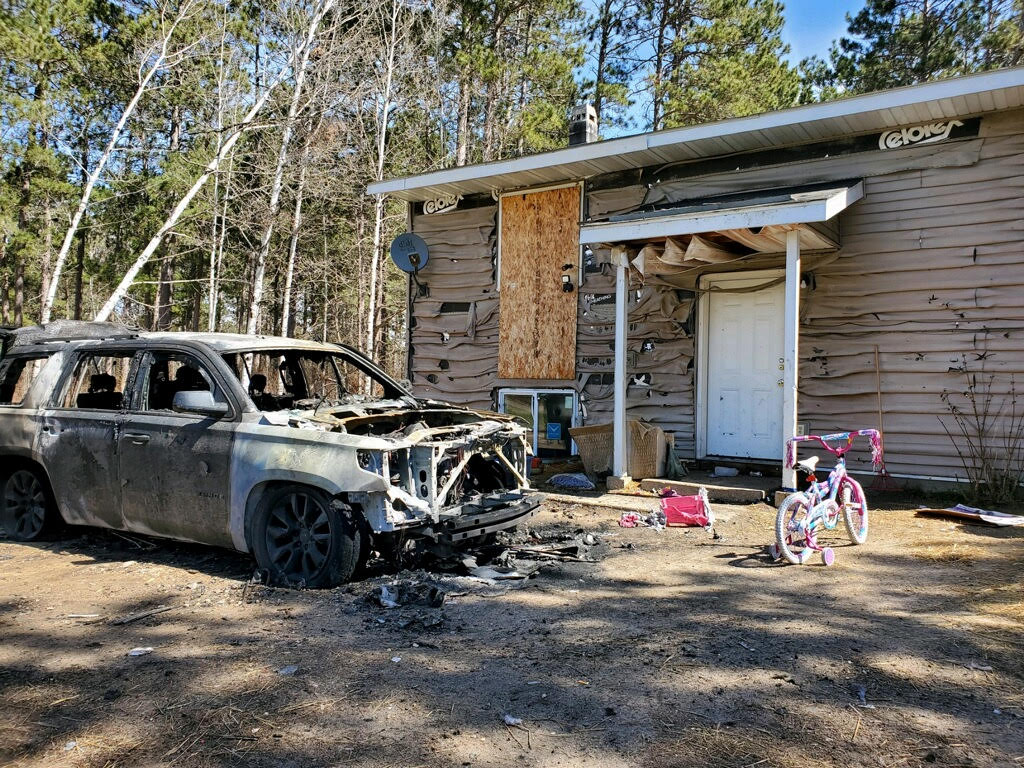
- Details
- By Darren Thompson
RED LAKE INDIAN RESERVATION —A house fire on the Red Lake Indian Reservation, in northern Minnesota, during the early morning hours of Friday, April 30 resulted from an explosion to a vehicle that was set on fire and the family is left displaced. Eight people were sleeping in the home, including a pregnant woman and four children, when someone inside heard a car alarm going off. Everyone safely escaped the fire, but the perpetrators are at-large and considered a danger to the tribal community.
Threats of violence including arson to the home where the person lived have been previously reported to police. This is the first arson.
The Federal Bureau of Investigation confirmed in email to Native News Online that an arson on Friday, April 30 on the Red Lake Indian Reservation has not been reported to the agency as of press time. The ATF didn’t immediately respond for comment. The Minnesota State Fire Marshal's Office informed Native News Online in a phone call that they are assisting the ATF with the investigation.
The Red Lake Nation Police Department has not released a statement on the incident as of press time. A dispatcher for the Red Lake Nation Police shared with Native News Online that the incident has been listed as a destruction of property incident, which is a misdemeanor crime, and suggested to call back for an official statement on Monday morning.
Video footage shared exclusively with Native News Online shows three individuals approaching a home at 3:45 am on Friday, April 30 with a container that was set on fire and thrown under the vehicle—a Chevy Tahoe. After the container was set on fire and thrown under the vehicle, one individual ran away while the other two continued to pour gasoline in the vehicle resulting in an explosion. The three individuals ran away from the fire, stopping to look at the fire briefly before escaping in the woods.
According to the National Center for the Analysis of Violent Crime, the most common motive for an arson is revenge (41%). An arsonist will target the home of someone in retaliation for an actual or perceived injustice against him or her. A car is viewed as an extension of the individual and is a very personal target for revenge arson.
The Red Lake Nation has full sovereignty over its reservation and is exempt from Public Law 280, subject only to the federal government. Felony crimes, such as arson, are investigated and prosecuted by the federal government—if they are reported. Because the action in question is arson, the subsequent investigation would fall to the jurisdiction of the Bureau of Alcohol, Tobacco, Firearms and Explosives (ATF).
Red Lake Nation Emergency Services assisted the displaced residents to a local hotel. Damage to the vehicle and home is estimated at more than $10,000. For some, Monday can’t come soon enough.
This is a developing story.
More Stories Like This
Native News Weekly (August 25, 2024): D.C. BriefsUS Presidents in Their Own Words Concerning American Indians
Native News Weekly (December 14, 2025): D.C. Briefs
Wounded Knee Massacre Site Protection Bill Passes Congress
Two Murdered on Colville Indian Reservation
Help us defend tribal sovereignty.
At Native News Online, our mission is rooted in telling the stories that strengthen sovereignty and uplift Indigenous voices — not just at year’s end, but every single day.
Because of your generosity last year, we were able to keep our reporters on the ground in tribal communities, at national gatherings and in the halls of Congress — covering the issues that matter most to Indian Country: sovereignty, culture, education, health and economic opportunity.
That support sustained us through a tough year in 2025. Now, as we look to the year ahead, we need your help right now to ensure warrior journalism remains strong — reporting that defends tribal sovereignty, amplifies Native truth, and holds power accountable.
 The stakes couldn't be higher. Your support keeps Native voices heard, Native stories told and Native sovereignty defended.
The stakes couldn't be higher. Your support keeps Native voices heard, Native stories told and Native sovereignty defended.
Stand with Warrior Journalism today.
Levi Rickert (Potawatomi), Editor & Publisher
